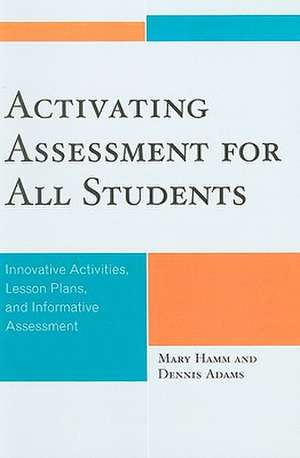Activating Assessment for All Students
Autor Mary Hamm, Dennis Adamsen Limba Engleză Paperback – 14 oct 2009
| Toate formatele și edițiile | Preț | Express |
|---|---|---|
| Paperback (2) | 289.04 lei 43-57 zile | |
| Rowman & Littlefield – 20 dec 2012 | 289.04 lei 43-57 zile | |
| Rowman & Littlefield – 14 oct 2009 | 384.76 lei 43-57 zile | |
| Hardback (1) | 636.38 lei 43-57 zile | |
| Rowman & Littlefield – 14 oct 2009 | 636.38 lei 43-57 zile |
Preț: 384.76 lei
Nou
Puncte Express: 577
Preț estimativ în valută:
73.65€ • 80.02$ • 61.90£
73.65€ • 80.02$ • 61.90£
Carte tipărită la comandă
Livrare economică 21 aprilie-05 mai
Preluare comenzi: 021 569.72.76
Specificații
ISBN-13: 9781607092094
ISBN-10: 1607092093
Pagini: 147
Dimensiuni: 150 x 226 x 15 mm
Greutate: 0.25 kg
Editura: Rowman & Littlefield
ISBN-10: 1607092093
Pagini: 147
Dimensiuni: 150 x 226 x 15 mm
Greutate: 0.25 kg
Editura: Rowman & Littlefield
Notă biografică
Descriere
This book builds on the expanding knowledge of what works in classrooms and suggests approaches that can open up individual and group possibilities for science and mathematics instruction, suggesting ways that formative assessment practices can inform differentiated teaching, learning, and assessment.


